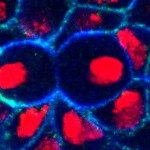Link to Pubmed [PMID] – 9518521
Dev. Genes Evol. 1998 Mar;208(1):19-27
Drosophila Hairless (H) encodes a negative regulator of Notch signalling. H activity antagonizes Notch (N) signalling during bristle development at the pupal stage. We show here by clonal analysis that H acts by inhibiting signal transduction rather than by promoting signal production, during both selection of microchaete precursors in the notum and vein cell differentiation in the wing. Allele-specific interactions further suggest that H inhibits Notch signal transduction by interacting directly with Suppressor of Hairless. Unexpectedly, this regulatory function of H appears to be essential only during imaginal development. Using a null allele of H that corresponds to a deletion of the H coding sequence, we show that embryos devoid of both maternal and zygotic gene products develop similarly to wild-type embryos. Thus, H activity is not strictly required to regulate N-mediated cell fate choices in the embryo.

